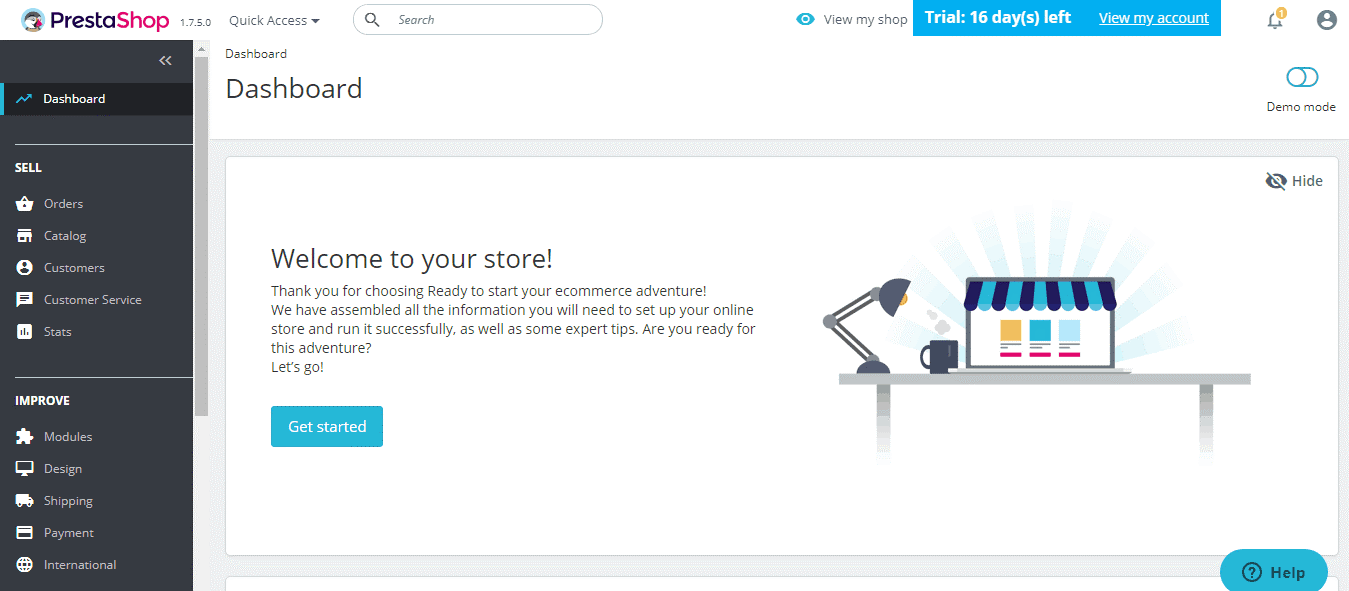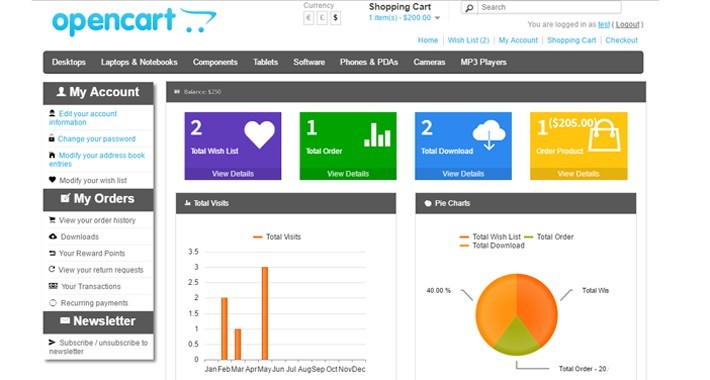Platform Comparison – PrestaShop Vs OpenCart
E-commerce has revolutionized the last 2-3 years with exponential changes in adaptability, mobile commerce, social media penetration, AI integration and analytics. Successful digital commerce today is a profitable combination of the right business model and the right choice of e-commerce platform. With that in mind, we’re going to compare PrestaShop with OpenCart in this article. We will analyze different aspects of these two very popular e-commerce platforms.
PrestaShop
PrestaShop was founded in 2007 as an open source and cloud-hosted e-commerce platform. Free and paid versions of this e-commerce software are available. The paid version, called PrestaShop Ready, can be purchased for EUR 24.90 / month or EUR 19.90 / year.
With the free version you can download, you will have to pay for SSL certificate, web hosting and other modules to set up your store properly. In addition, you may have to pay for a developer who has technical skills in CSS, HTML, and / or PHP. The good part is PrestaShop which allows for a strong integration of payment gateways, courier services, accounting, ERP and warehouses.
There are 10 free themes but you may need HTML and CSS knowledge because there is no “drag and drop”.

Example of an E-shop on PrestaShop
Beauty Lounge is an example of an E-shop based on PrestaShop, selling cosmetics.
Pros and Cons of PrestaShop
As with other e-commerce platforms, PrestaShop is packed with several powerful features. However, it also has some drawbacks. Let’s look at its pros and cons.
| Pros | Cons |
| Important SEO Features | Slower that the other platforms |
| Can be hosted autonomously | Limited compatibility with third party apps |
| Many available aplications | Probably high long-term cost because of applications |
| Very flexible open source | Necessary code knowledge to get you started |
| Large numbers of user who can help you | The hosted version doesn’t have multi-channel mode |
| Improves the loading time of the website | Some important sections of PrestaShop must be purchased |
| Easy theme migrations | Limit to further development |
| A solid choice for beginners and midsized e-commerce companies | It can be difficult to make major upgrades, as codes and sections need to be rebuilt |
| Flexible and easy to learn and to design | |
| Many available languages and currencies |
OpenCart
OpenCart is an open source online shopping cart based on PHP. It is a powerful e-commerce platform that enables e-commerce companies to set up and manage their own online stores at minimal cost. OpenCart themes are also rich and easy to use.
OpenCart offers a set of key features – including powerful directory functionality and a good order processing engine. Caching needs to be added using an extension to improve store performance, as it is not provided. Although this e-commerce software does not promise very high performance without additional add-ons, it may be the best choice for small shops that do not need much to get started.
OpenCart contains a number of default shipping and payment systems and also supports the installation of multiple stores. As a user, you will have access to the OpenCart community, which will provide you with the necessary commercial support for a successful experience. If you are familiar with how WordPress works as a platform, you will learn OpenCart very quickly.

Example of an E-shop on OpenCart
Shore Lines is a typical example of an OpenCart E-shop specializing in mountain bikes and various accessories. This theme makes the online store look right and really professional.
Pros and Cons of OpenCart
Some e-commerce platforms – such as OpenCart and PrestaShop – have become popular as they have been carefully designed to incorporate several easy-to-use e-commerce features. On the other hand, these platforms also have their drawbacks. Let’s look at the advantages and disadvantages of OpenCart.
| Pros | Cons |
| Many languages supported | There may be a problem with SEO by creating many similar pages |
| It offers a comprehensive set of metrics and analyzes through the administration page | Extensions and modules may not work well together |
| It supports 13,000 modules for dedicated management | It’s difficult to refresh the catalog without a plugin |
| Compatible with all payment methods | Sometimes the process of payment is delayed |
| Compatible with all delivery methods | Limited scalability |
| Exclusive technical support | |
| Many completely free add-ons |
In more detail
Pricing
PrestaShop is a free open source platform. However, if you want to buy add-ons, the cost is around $ 50 to $ 150 per add-on.
OpenCart is a free downloadable open source platform and runs on the Core + Extensions model that requires add-ons to perform high-level operations.
User friendly
PrestaShop has a customizable front office and a handy back office, which makes this eCommerce software very user-friendly. It also offers various extras to improve its internal functions. It has an elegant management profile from which you can see your store’s performance at a glance.
OpenCart is very user-friendly due to its well-designed interface. Users do not need the know-how to add, edit, or modify within the platform.
Customer Support
PrestaShop has a diverse community of users to solve technical issues, discuss upgrades, etc. through forums and services. It comes with different pricing plans for different levels of support. The least expensive plan is for 249 euros per month for 3 hours of support or 399 euros per year with a minimum of one year’s subscription, providing only up to 6 hours of support per year.
OpenCart provides dedicated merchant support through the free community. These communities are free and you can easily find a developer to answer your questions. Its dedicated support has two options – one-time support and monthly support that cost 99 euros each.
Search Engine Optimization – SEO
PrestaShop provides a range of SEO options that allow you to edit pages, create SEO-friendly URLs, rank meta-tags, etc., so that your products are easily recognized and taken over by search engines.
OpenCart also offers a number of key SEO features, such as keyword adjustments, meta tags, and descriptions. On the other hand, OpenCart requires a lot of changes to its codebase if you want to succeed in SEO. The eCommerce platform also helps you create SEO URLs out of the box with the help of plugins to boost SEO performance.
In Conclusion
E-commerce platforms can be quite complex, and in terms of discussing PrestaShop vs. OpenCart, it is difficult to distinguish one as the winner, as both of these e-commerce platforms are extremely popular and widely used. However, we would definitely prefer the eCommerce themes available at PrestaShop to those of OpenCart, as it gives it a slightly more modern feel. The final decision is always yours of course.



